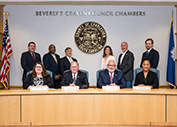Law on Appraisal Rights and Deficiency Judgements
The master's scope of review is limited to either approval or disapproval of the appraisal. Judgment entered thereon is controlled by Section 29-3-750, S.C. Code.Peoples Fed. S&L v. Myrtle Beach Group, 302 S.C. 223, 394 S.E. (2d) 849 (Ct. App. 1990).
The object of our appraisal statute is to insure that a mortgagor's property is not sacrificed at a forced sale. This is accomplished by substituting the fair value of the property for the price at foreclosure sale as the amount to be deducted from the debt in order to fix the amount of a deficiency judgment. 59 C.J.S. Mortgages Section 782 (1949); G. Osborne, Handbook on the Law of Mortgages Section 335 (2d. 1970). Unlike some other deficiency statutes, our Act contains no penalties if the lender is the purchaser at the foreclosure sale. See S.C. Code Ann. Section 29-3-670 (1976). See also concurring opinion of Judge Cureton inPeoples Fed., supra at 232.
The controlling statutes are Section 29-3-660 through Section 29-3-760, Code of Laws of South Carolina (1976). Briefly, a mortgagor defendant in a foreclosure action upon which deficiency judgment is rendered may within thirty days after the sale of the mortgaged property apply by verified petition to the Clerk of Court for an appraisal. S.C. Code Section 29-3-680. In First South Savings Bank v. Gold Coast Assoc., 301 S.C. 158, 390 S.E. 2d 486 (Ct. App. 1990), the Court of Appeals construed this statute to determine when the time begins to run for filing a petition for order of appraisal to mean that the word "sale" refers to the judicial sale at public auction plus the thirty day period for possible upset bids. This thirty day period can not be extended or enlarged except by a written consent of the judgment creditor. S.C. Code Section 29-3-690.
The Clerk of Court shall then issue an order that the property be appraised at its true value as of the date of sale by three disinterested freeholders of the County in which the property is located. Section 29-3-710 provides that both the defendant mortgagor(s) and the plaintiff mortgagee(s) shall each appoint an appraiser and that thereupon the court shall appoint a third. Section 29-3-720 provides that the board of appraisers so constituted shall than appraise the property and shall make a sworn return "of the true value of the property as of the date of sale, taking into consideration sale value, cost and replacement value of improvements, income production and all other proper elements which, in their discretion, enter into the determination of true value." And as noted Section 29-3-740 then provides "[t]he return of the appraisers shall be filed and recorded by the clerk as a judgment of the court and be subject to appeal . . .." Section 29-3-750 provides that the court "shall hear the appeal without a jury in open court or at chambers upon affidavits or oral testimony as he deems advisable. Such court may confirm the return or order a new appraisal upon such terms as he may deem equitable and an appeal from his order or decree shall lie as in other equity cases. "Peoples Fed., supra at 228, 229.
Section 29-3-720 and that part of Section 29-3-740 which provides that the return of the appraisal shall be entered by the Clerk of Court as a judgment of the court caused the Court of Appeals to conclude that in this state the appraisers act in a quasi-judicial capacity insofar as their factual determination of the value of the subject property. Peoples, supra at 229. The Court of Appeals adopted language from the case of South Carolina National Bank v. Central Carolina Livestock Market, Inc., 289 S.C. 309, 311-312, 345 S.E. 2d 485, 487 (1986); from it quoting:
If an appeal is taken, the Circuit Court hears the appeal without a jury. The Act provides the judge with a veritable smorgasbord of procedures from which to choose in determining the appeal. He may hear the appeal "upon affidavits or oral testimony as he deems advisable." If he determines that the appraisal does represent the true value of the property, he confirms the appraisal and an aggrieved party has the right to appeal to this Court. On the other hand, if the judge determines that the appraisal does not fairly represent the value of the property, he may "order a new appraisal upon such terms as he may deem equitable."
The only discretion allowed the court by the statute is to order a reappraisal in which event the court is authorized to impose such terms, such as the method of appraisal, as it might in its discretion deem equitable. Peoples, supra at 230.
Guarantors are entitled to the benefit of the appraisal statute. Anderson Brothers Bank v. Adams, 305 S.C. 25, 406 S.E. 2d 173 (1991).
Contact
Master-In-Equity
Charleston County Judicial Center
![]() 100 Broad Street, Suite 266
100 Broad Street, Suite 266
Charleston, SC 29401
Phone: (843)958-5070
Fax: (843)958-5077
E-mail: khodge@charlestoncounty.org
Office Hours:
Mon. - Fri. 8:30am - 5pm




